2025年中考英语语法教学之词汇与句型课件(共27张PPT)
文档属性
| 名称 | 2025年中考英语语法教学之词汇与句型课件(共27张PPT) |

|
|
| 格式 | pptx | ||
| 文件大小 | 4.4MB | ||
| 资源类型 | 教案 | ||
| 版本资源 | 通用版 | ||
| 科目 | 英语 | ||
| 更新时间 | 2025-07-15 08:41:03 | ||
图片预览

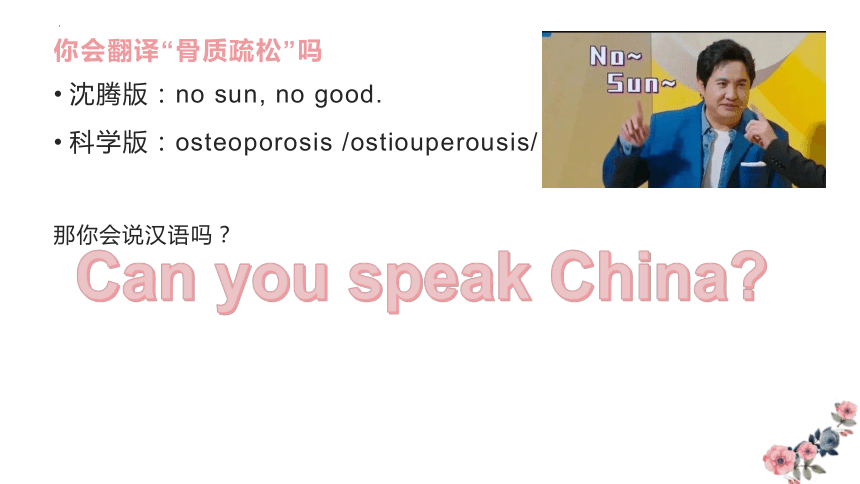

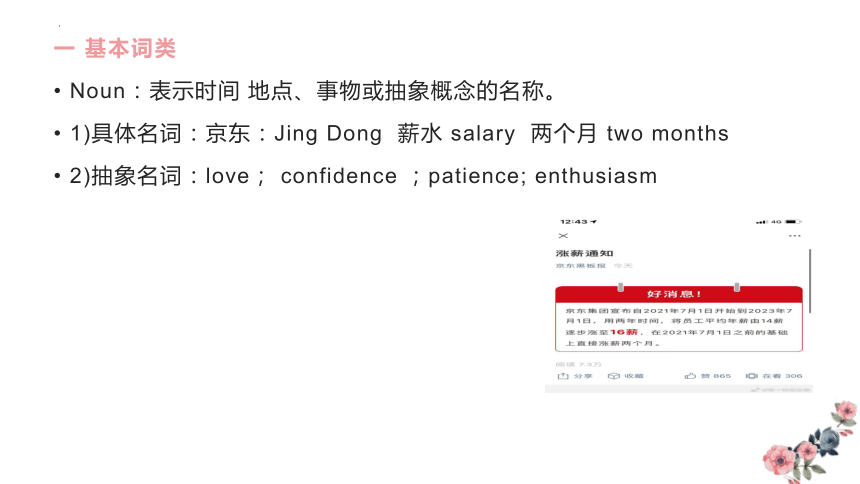
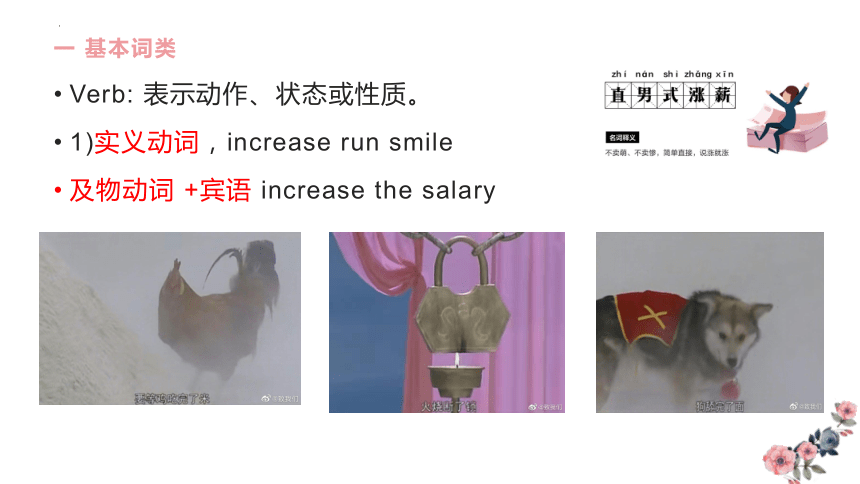
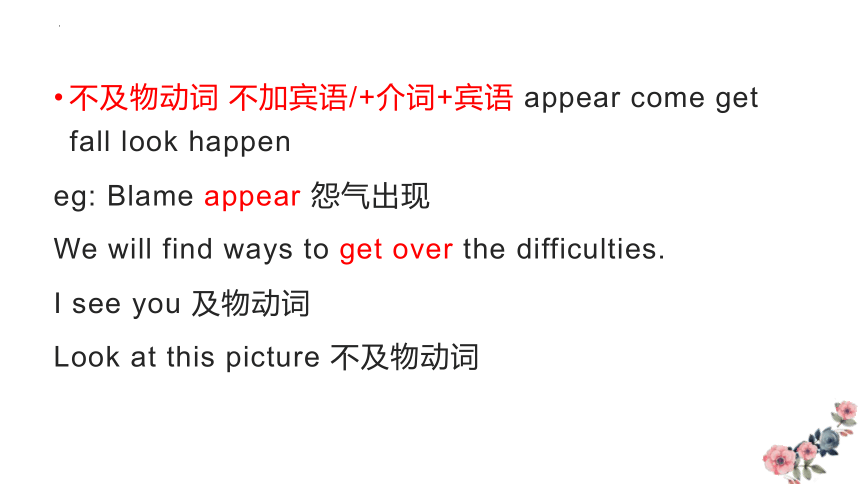
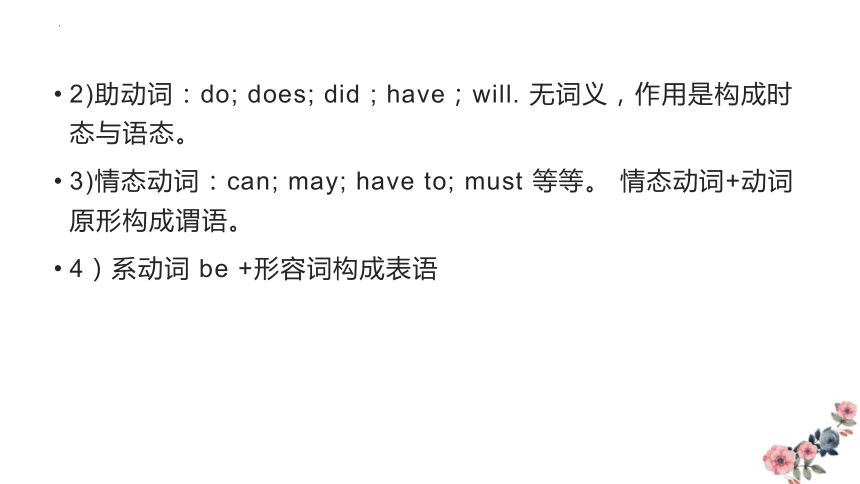
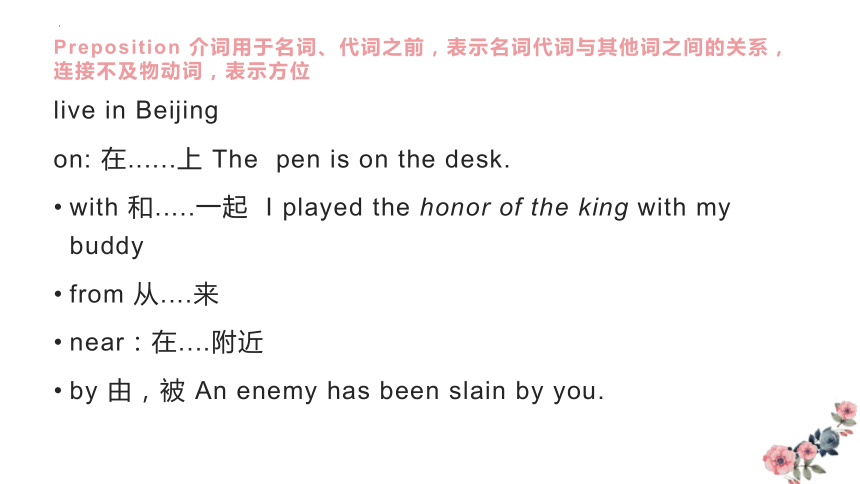
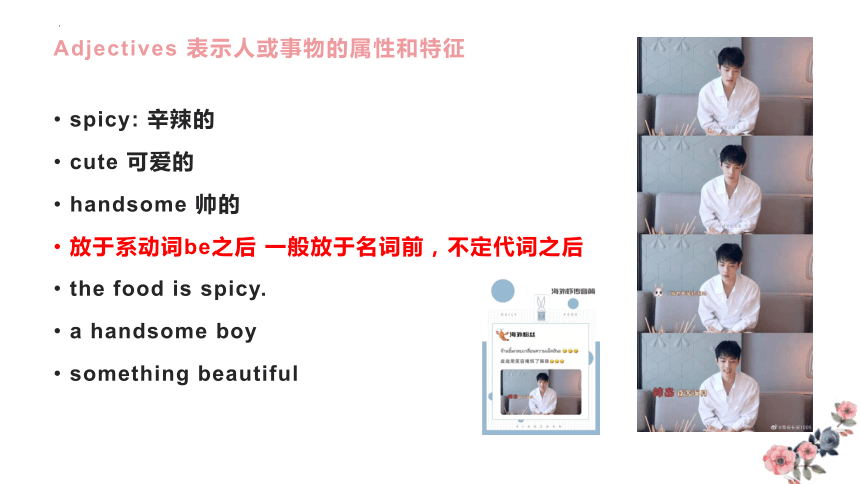
文档简介
(共27张PPT)
词汇与句式
你会翻译“骨质疏松”吗
沈腾版:no sun, no good.
科学版:osteoporosis /ostiouperousis/
那你会说汉语吗?
Can you speak China
目 录
CONTENTS
01
基本词类
02
基本成分
03
五大基本句型
一 基本词类
Noun:表示时间 地点、事物或抽象概念的名称。
1)具体名词:京东:Jing Dong 薪水 salary 两个月 two months
2)抽象名词:love; confidence ;patience; enthusiasm
一 基本词类
Verb: 表示动作、状态或性质。
1)实义动词,increase run smile
及物动词 +宾语 increase the salary
不及物动词 不加宾语/+介词+宾语 appear come get fall look happen
eg: Blame appear 怨气出现
We will find ways to get over the difficulties.
I see you 及物动词
Look at this picture 不及物动词
2)助动词:do; does; did ; have;will. 无词义,作用是构成时态与语态。
3)情态动词:can; may; have to; must 等等。 情态动词+动词原形构成谓语。
4)系动词 be +形容词构成表语
Preposition 介词用于名词、代词之前,表示名词代词与其他词之间的关系,连接不及物动词,表示方位
live in Beijing
on: 在......上 The pen is on the desk.
with 和.....一起 I played the honor of the king with my buddy
from 从....来
near:在....附近
by 由,被 An enemy has been slain by you.
Adjectives 表示人或事物的属性和特征
spicy: 辛辣的
cute 可爱的
handsome 帅的
放于系动词be之后 一般放于名词前,不定代词之后
the food is spicy.
a handsome boy
something beautiful
Adverbs:修饰动词、形容词、其它副词或全句,表示行为特征或性状特征
形式:1)形容词+ly 翻译:...地
bravely:勇敢地 You need do this bravely.
play happily 玩的开心
2)以-ble或-le结尾,去e加y possible---possibly
3)少数以e结尾,去e加ly true---truly,多数直接加-ly polite---politely
4) 以-l结尾直接加ly. usual---usually; careful---carefully. 以-ll结尾只加-y ful---fully ;
Pronouns 代替名词、数词以避免重复
辣得我眼泪横飞。 I:代指肖战。
兔兔:我也不是好惹的。I:代指兔兔。
them:他们; everything:不定代词
eg: everything is ok
Numerals:表示数量或顺序
基数词:one two three four five
序数词:first、 second、 third、 fourth 第一 第二 第三......
Articles 冠词 用于名词之前,帮助说明名词的含义。a an the 零冠词
Eg: A bird is here.
The bird is green.
An interesting bird is singing.
Birds are our friends.
Conjuction 连接单词、短语、从句或句子
and: you and me from one world, heart to heart.
but: 但是 表示转折
interjection:感叹词 表示说话时的语气和感情
Wow,you are so handsome. 哇!
oh I got it
句子的基本成分
主语:一个句子所叙述的主体。一般放于句首。即“谁怎么怎么样。动作发生的执行者
eg : A tree has fallen across the road. 树横倒在路上。
We often speak English in class.
谓语 表示主语的动作或具有的性质和状态。
形式:1 简单谓语:由一个动词或者动词短语构成
eg:She practices running every day
2 复合谓语:由情态动词或其他助动词加动词原形构成。
You may keep the book for two weeks.
表语 说明主语的身份、特征和状态,位于系动词之后
系动词 : 感官动词:feel, smell,sound, taste ; be动词(am is are)become keep
You are eighteen.
these desks are yellow.
宾语:动作的承受者。位于及物动词之后
直接宾语: I give a double kill.
间接宾语:I give the enemy a double kill.
宾语补足语:补充说明宾语
Tom made the girl cry.
We consider him a teacher.
定语:修饰名词或代词的词、短语或从句成为定语 起限定作用
There are two boys in the room.
Tom is a handsome boy
状语:修饰动词、形容词、副词或整个句子,说明动作或状态特征的句子成分
eg: He speaks the language badly but reads it well.
In order to catch up with the others, I must work harder.
同位语:俩句子成分指同一事物,一个句子成分解释说明另一个句子 。前者即为后者的同位语
Mr.Smith,our new teacher, is very kind to us.
We Chinese people are brave and hardworking.
句子的五大基本类型
1 主+谓
不及物动词后不加宾语,但可以有副词或者别的状语修饰。
不及物动词VS不及物动词
及物动词+宾语 有被动形式; 不及物动词+介词+宾语
These children are playing football.
These children are playing.
Eg: He works.
He works hard.
主+谓+宾
此时谓语是及物动词。这种动词告诉我们由主语发出的动作所作用的对象是什么,即动作的承受者-- 宾语
I love grammar.
I hate the Internet.
主系表
系动词:不表示具体的动作,起连接主语和后面成分的作用。动词后面所接成分是不用说明的特点,表明主语的性质特征的,因此我们称之为主语补足语,或表语。
Internet dating is popular.
He is happy.
He looks happy.
主+谓+间宾+直宾
谓语动词是双宾动词,后边所接成分有 “人”和“物”, 人表示动作的接受者,为间接宾语。“物”表示动作作用的对象,是动作的承受者,称作直接宾语。直接宾语+间接宾语=双宾语
English movies bring me a lot of fun.
Mother bought me a gift.
主+谓+宾+宾补
宾语补足语:补充说明前边的宾语。
宾补+宾语=复合宾语
Baby, you are driving me crazy.
Grammar made me mad.
辨析“主+谓+间宾+直宾” 与 “主+谓+宾+宾补”
方法:在宾语后边加上be动词,若构成一个语义通顺的句子,则是补足语;若不能就是间接宾语与直接宾语。
I made John our chairman.
I made John a cake.
词汇与句式
你会翻译“骨质疏松”吗
沈腾版:no sun, no good.
科学版:osteoporosis /ostiouperousis/
那你会说汉语吗?
Can you speak China
目 录
CONTENTS
01
基本词类
02
基本成分
03
五大基本句型
一 基本词类
Noun:表示时间 地点、事物或抽象概念的名称。
1)具体名词:京东:Jing Dong 薪水 salary 两个月 two months
2)抽象名词:love; confidence ;patience; enthusiasm
一 基本词类
Verb: 表示动作、状态或性质。
1)实义动词,increase run smile
及物动词 +宾语 increase the salary
不及物动词 不加宾语/+介词+宾语 appear come get fall look happen
eg: Blame appear 怨气出现
We will find ways to get over the difficulties.
I see you 及物动词
Look at this picture 不及物动词
2)助动词:do; does; did ; have;will. 无词义,作用是构成时态与语态。
3)情态动词:can; may; have to; must 等等。 情态动词+动词原形构成谓语。
4)系动词 be +形容词构成表语
Preposition 介词用于名词、代词之前,表示名词代词与其他词之间的关系,连接不及物动词,表示方位
live in Beijing
on: 在......上 The pen is on the desk.
with 和.....一起 I played the honor of the king with my buddy
from 从....来
near:在....附近
by 由,被 An enemy has been slain by you.
Adjectives 表示人或事物的属性和特征
spicy: 辛辣的
cute 可爱的
handsome 帅的
放于系动词be之后 一般放于名词前,不定代词之后
the food is spicy.
a handsome boy
something beautiful
Adverbs:修饰动词、形容词、其它副词或全句,表示行为特征或性状特征
形式:1)形容词+ly 翻译:...地
bravely:勇敢地 You need do this bravely.
play happily 玩的开心
2)以-ble或-le结尾,去e加y possible---possibly
3)少数以e结尾,去e加ly true---truly,多数直接加-ly polite---politely
4) 以-l结尾直接加ly. usual---usually; careful---carefully. 以-ll结尾只加-y ful---fully ;
Pronouns 代替名词、数词以避免重复
辣得我眼泪横飞。 I:代指肖战。
兔兔:我也不是好惹的。I:代指兔兔。
them:他们; everything:不定代词
eg: everything is ok
Numerals:表示数量或顺序
基数词:one two three four five
序数词:first、 second、 third、 fourth 第一 第二 第三......
Articles 冠词 用于名词之前,帮助说明名词的含义。a an the 零冠词
Eg: A bird is here.
The bird is green.
An interesting bird is singing.
Birds are our friends.
Conjuction 连接单词、短语、从句或句子
and: you and me from one world, heart to heart.
but: 但是 表示转折
interjection:感叹词 表示说话时的语气和感情
Wow,you are so handsome. 哇!
oh I got it
句子的基本成分
主语:一个句子所叙述的主体。一般放于句首。即“谁怎么怎么样。动作发生的执行者
eg : A tree has fallen across the road. 树横倒在路上。
We often speak English in class.
谓语 表示主语的动作或具有的性质和状态。
形式:1 简单谓语:由一个动词或者动词短语构成
eg:She practices running every day
2 复合谓语:由情态动词或其他助动词加动词原形构成。
You may keep the book for two weeks.
表语 说明主语的身份、特征和状态,位于系动词之后
系动词 : 感官动词:feel, smell,sound, taste ; be动词(am is are)become keep
You are eighteen.
these desks are yellow.
宾语:动作的承受者。位于及物动词之后
直接宾语: I give a double kill.
间接宾语:I give the enemy a double kill.
宾语补足语:补充说明宾语
Tom made the girl cry.
We consider him a teacher.
定语:修饰名词或代词的词、短语或从句成为定语 起限定作用
There are two boys in the room.
Tom is a handsome boy
状语:修饰动词、形容词、副词或整个句子,说明动作或状态特征的句子成分
eg: He speaks the language badly but reads it well.
In order to catch up with the others, I must work harder.
同位语:俩句子成分指同一事物,一个句子成分解释说明另一个句子 。前者即为后者的同位语
Mr.Smith,our new teacher, is very kind to us.
We Chinese people are brave and hardworking.
句子的五大基本类型
1 主+谓
不及物动词后不加宾语,但可以有副词或者别的状语修饰。
不及物动词VS不及物动词
及物动词+宾语 有被动形式; 不及物动词+介词+宾语
These children are playing football.
These children are playing.
Eg: He works.
He works hard.
主+谓+宾
此时谓语是及物动词。这种动词告诉我们由主语发出的动作所作用的对象是什么,即动作的承受者-- 宾语
I love grammar.
I hate the Internet.
主系表
系动词:不表示具体的动作,起连接主语和后面成分的作用。动词后面所接成分是不用说明的特点,表明主语的性质特征的,因此我们称之为主语补足语,或表语。
Internet dating is popular.
He is happy.
He looks happy.
主+谓+间宾+直宾
谓语动词是双宾动词,后边所接成分有 “人”和“物”, 人表示动作的接受者,为间接宾语。“物”表示动作作用的对象,是动作的承受者,称作直接宾语。直接宾语+间接宾语=双宾语
English movies bring me a lot of fun.
Mother bought me a gift.
主+谓+宾+宾补
宾语补足语:补充说明前边的宾语。
宾补+宾语=复合宾语
Baby, you are driving me crazy.
Grammar made me mad.
辨析“主+谓+间宾+直宾” 与 “主+谓+宾+宾补”
方法:在宾语后边加上be动词,若构成一个语义通顺的句子,则是补足语;若不能就是间接宾语与直接宾语。
I made John our chairman.
I made John a cake.
